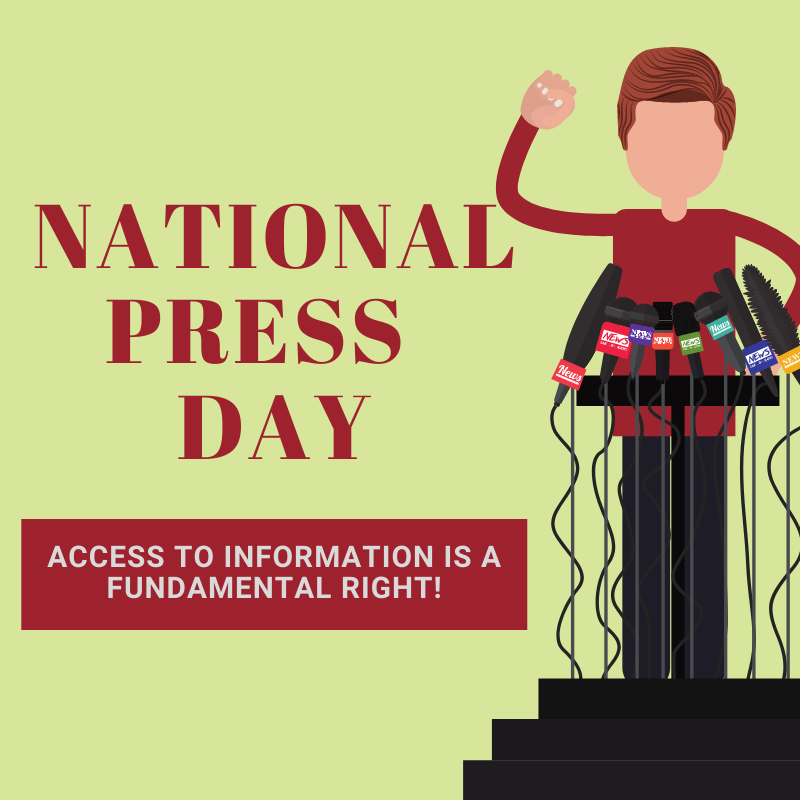National Press Day: Commemorating Press Freedom And Ethics
Syllabus:
GS-2:
Fundamental Rights ,Quasi Judicial Bodies
Focus:
National Press Day is observed annually on November 16 to commemorate the establishment of the Press Council of India (PCI) in 1966. It emphasises the critical role of a free press in fostering a vibrant democracy and promotes the importance of ethical journalism.
Overview and Significance
- Annual Observation: National Press Day is celebrated every year on November 16, marking the establishment of the Press Council of India (PCI) in 1966.
- Symbol of Press Independence: It underscores the press’s vital role in democracy and highlights ethical journalism as a cornerstone of transparency and accountability.
- Acknowledging Challenges: The day also serves as a platform to address issues like censorship, misinformation, and the growing influence of digital media on traditional journalism.
Understanding National Press Day:
- When Started:
The day began in 1966, marking the establishment of the Press Council of India (PCI) as a statutory and autonomous body. - Theme:
The theme for 2024 is “Changing Nature of the Press,” reflecting on the evolving dynamics of journalism and its adaptability to technological and societal changes. - Edition:
The 58th edition of National Press Day is celebrated in 2024, honouring decades of press contribution since its inception. - Reason:
- The day commemorates the formation of the Press Council of India and highlights the press’s role as the fourth pillar of democracy, ensuring transparency, accountability, and ethical reporting.
- Static Information:
- Founded: 4 July 1966, India
- Headquarters: New Delhi
- Chairperson: Justice Ranjana Prakash Desai, Hon’ble Chairperson of PCI.
Press Council of India (PCI): Key Points
About:
- Established in 1966 under the Indian Press Council Act, 1965 based on recommendations of the First Press Commission.
- Reestablished in 1979 under the Press Council Act, 1978 as a quasi-judicial, autonomous authority.
- The only body empowered to safeguard press independence from State influence.
Structure:
- Consists of a Chairman and 28 members.
- Chairman is selected by a panel including the Speaker of Lok Sabha, Chairman of Rajya Sabha, and an elected Council member.
Objectives:
- Preserve freedom of the press.
- Maintain and improve standards of journalism in India.
Roles & Responsibilities:
- Role: Advises on laws and matters affecting the press; conducts inquiries into public concerns.
- Responsibilities: Establishes a code of conduct, promotes journalistic independence, and ensures ethical reporting standards.
The Press Council of India (PCI): History and Function
- Formation in 1966: PCI was established as a statutory, quasi-judicial body to safeguard press freedom and ensure ethical standards.
- Reconstitution in 1978: The Press Council Act reinforced its authority, making it an independent self-regulating body.
- Role as a Watchdog: PCI ensures unbiased reporting, resolves disputes between the press and public, and addresses ethical violations in journalism.
- Quasi-Judicial Role: The council handles cases of unethical practices and protects journalists’ rights against external interference.
Themes and Activities of National Press Day:
- 2024 Theme: “Changing Nature of the Press” reflects the evolving dynamics of journalism amidst rapid technological and societal changes.
- Events and Celebrations:
- Panel Discussions: Experts discuss press freedom and ethics challenges.
- Workshops: Focus on combating fake news, responsible reporting, and maintaining journalistic integrity.
- Awards and Honors: Journalists are recognized for their contributions to investigative journalism and social awareness.
- High-Profile Celebrations: The 2024 event in New Delhi features key figures, including Shri Ashwini Vaishnaw and Smt. Justice Ranjana Prakash Desai, addressing press-related challenges.
Press’s Role in Strengthening Democracy:
- Fourth Pillar of Democracy: The press informs citizens, ensures transparency, and holds governments accountable.
- Advancing Social Justice: Investigative journalism sheds light on social inequalities and advocates for marginalised groups.
- Promoting Public Awareness: By reporting on current events and policies, the media fosters informed decision-making among the populace.
- Addressing Systemic Gaps: The press amplifies voices from underrepresented sections and highlights issues requiring systemic reform.
Challenges Faced by the Media:
- Ethical Dilemmas: The rise of fake news and sensationalism threatens credibility, requiring journalists to balance speed with accuracy.
- Censorship and Harassment: Journalists often face threats or violence for covering sensitive issues, highlighting the need for mechanisms to safeguard press freedom.
- Economic Constraints: Digital transformation has led to declining revenues for traditional media, impacting editorial independence and operational sustainability.
- Navigating Technology: The increasing influence of social media requires adapting to new platforms while upholding journalistic standards.
Emerging Challenges:
- Digital Transformation: Rapid changes in technology demand adaptation in news production and dissemination.
- Threats to Credibility: Issues like misinformation, political polarisation, and censorship challenge press integrity.
- Maintaining Ethics: Upholding accountability and ethical standards remains crucial in preserving public trust.
Contribution and Autonomy of PCI:
- Independent Oversight: The PCI operates autonomously, safeguarding press independence while ensuring adherence to ethical standards.
- Global Comparisons: India is among the 50 countries with a Press Council or Media Council emphasising self-regulation.
- Judicial Authority: It addresses grievances and arbitrates on journalistic misconduct, ensuring balance between freedom and responsibility.
Key Takeaways and Constitutional Backing:
- Constitutional Protection: Press freedom is guaranteed under Article 19(1)(a) of the Indian Constitution, ensuring the right to freedom of speech and expression.
- Legal Framework: The Press Council Act of 1978 further reinforces press standards and independence.
- Reflection and Reaffirmation: National Press Day inspires introspection on the evolving role of the press, reaffirming its responsibility to society.
Conclusion:
National Press Day underscores the importance of a free press in a democratic society. It celebrates journalistic responsibility, encourages ethical reporting, and reaffirms the role of the press as a catalyst for accountability and societal change.
Source: PIB
Mains Practice Question:
Discuss the significance of National Press Day in highlighting the role of press freedom and accountability in a democracy. What challenges does the Indian press face today, and how can they be addressed?




